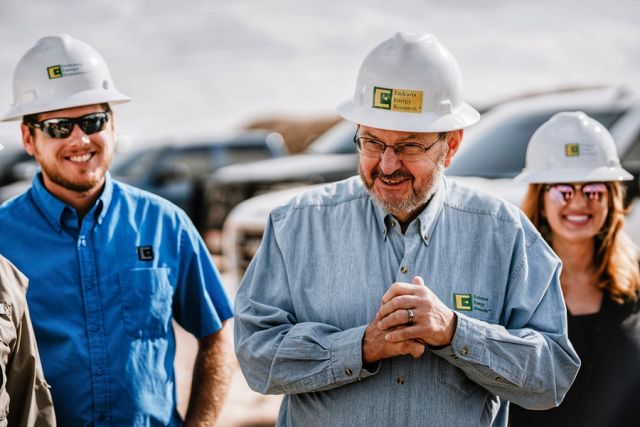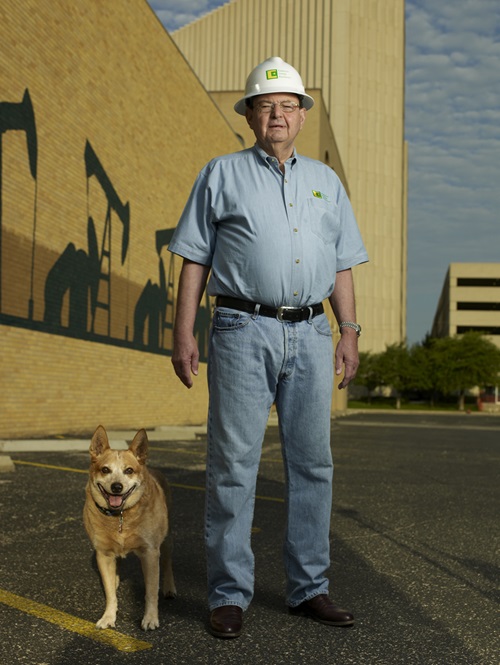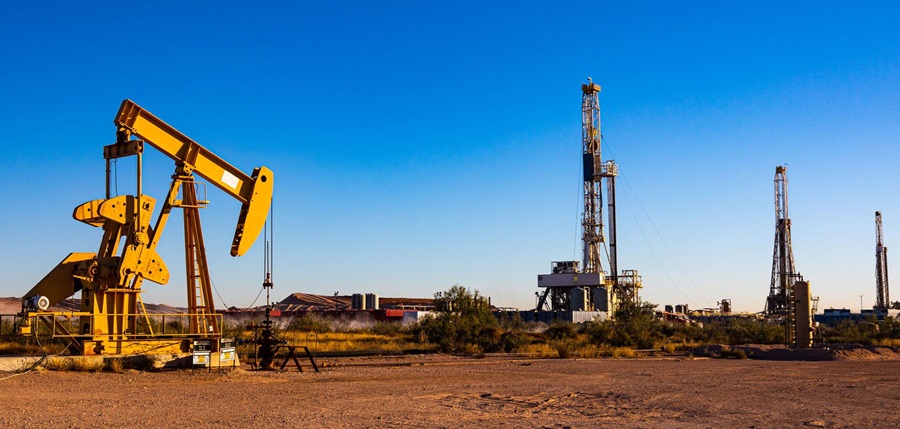
Legendary wildcatter Autry Stephens, founder and chairman of Midland Basin E&P Endeavor Energy Resources, stayed true to his “never sell” strategy. (Source: Hart Energy archives)
It was well understood in the Midland Basin that Autry Stephens would never sell his portfolio of production and acreage that grew to 420,000 gross operated boe/d by early 2024.
It was well understood, largely, because he said so himself.
And although Stephens signed a deal in February to divest his Endeavor Energy Resources to downtown Midland neighbor and peer Diamondback Energy for $26 billion in cash and stock, his mantra over the decades was “never sell.” And he never did, at least not officially.

The 45-year wildcatter died Aug. 16 after a long battle with cancer at the age of 86; the deal was not yet completed and is still wrangled in the review process at the Federal Trade Commission (FTC).
His daughter, Lyndal Stephens Greth, who was Endeavor’s vice chairman, assumed the post of chairman upon Stephens’ death.
Greth will oversee the closing, which involves 410,000 net acres, including 339,000 in the Midland Basin, 1,380 horizontal wells, 2,250 still-active vertical wells and more than 1,100 employees.
The operator has more than 4,000 future-well locations on its property that are economic at $65/bbl WTI, according to a J.P. Morgan Securities estimate in 2023. J.P. Morgan ranked Endeavor second in inventory in the basin, trailing only Pioneer Natural Resources, another Midland Basin pure play, which was sold to Exxon Mobil earlier this year for $64.5 billion.
‘Courage, grit and tenacity’
“Autry embodied the wildcat mentality of courage, grit and tenacity associated with the Permian Basin,” Lance Robertson, Endeavor president and CEO, said in the company’s announcement of Stephens’ passing.
The wildcatter came up on a farm in DeLeon, Texas, “where he learned first-hand the value of hard work, growing peanuts and a variety of fruits,” Endeavor reported.
Stephens told Hart Energy in a 2014 interview that, after high school, he didn’t stay in the family business when his father told him, “maybe you should find something other than farming to do.”
You see, he explained, “I was raised on the farm, but I wasn’t a very good farmer.”
He studied petroleum engineering instead, receiving master’s and bachelor’s degrees from the University of Texas at Austin.
“My goal at that time was to get a degree and work 30 years for a great company with a steady salary and nice retirement plan,” he said.
Well, that didn’t suit him, either.
After a time at Humble Oil & Refining, he packed up and moved to Midland, joining First National Bank of Midland as a reserves engineer.
That didn’t suit him for long, either.
He set out on his own in 1979 with some savings and some land, drilling his first well, the McClintic B-30 #2 in Midland County, operating simply as “Autry C. Stephens” as his company’s name.
In 2000, he named the portfolio he had amassed Endeavor Energy.
‘Fairly terrifying’
Setting out on his own, he told Hart Energy, “was fairly terrifying. I started out doing consulting engineering and had some consulting work lined up prior to giving up my paycheck.”
“My engineering experience gave me some hope that I could sell my services and support my family, so I had a little bit of a fallback—a skill—to survive on.”
He didn’t have an interest in taking Endeavor public, flatly saying at the time that “my skill set does not seem well-suited for the public domain.”
More specifically, he explained, a lot of the job of running a public E&P just doesn’t have anything to do with what he most enjoyed: Bringing in oil wells.
“There are a lot of associated legal and accounting costs, and dealing with Wall Street takes a lot of time away from the business of producing oil,” Stephens said.
Of course, he added, “I never say ‘never,’ but we don’t have any plans for that right now.”
That didn’t change in the past 10 years, as Stephens continued to operate privately.

Boots on the ground
Stephens built Endeavor the old-fashioned way: boots on the ground.
“Autry’s aggregation of unloved oil wells across the Permian Basin—many acquired through live-auction processes—and his and his team’s ability to improve them and extend their life set him apart,” said Steve Pruett, a Midland-based oil producer and chairman of the Independent Petroleum Association of America (IPAA).
That boots-on-the-ground tack came naturally, since he had “a love of adventure and being outdoors, which sparked an early interest in the petroleum industry,” the company reported.
And there was certainly adventure: four decades of whipsaw up- and down-cycles in the oil business.
Through it all, “he created a massive Permian-focused production, acreage and infrastructure asset” that included in-house well-service, drilling and completions, said Pruett, who is president and CEO of Permian-focused Elevation Resources.
When peers began rolling out horizontal, stimulated drilling and completion in the Permian—beginning first in the Midland Basin—in the early 2010s, “Endeavor was ideally positioned to capitalize on it,” Pruett said.
Yet Stephens waited, watching neighbors perfect the drilling and completion recipe on these massive holes, while having leasehold already HBP and vertical wells that were cash-flowing to the company.
Going horizontal
In 2016, though, he dove in, recruiting Robertson from his position of vice president of U.S. unconventional resources at Marathon Oil. Prior, Robertson had been vice president of engineering and exploitation at Pioneer, which had been drilling stimulated laterals in super-tight rock for more than a decade by then.
In the 2010s, many privately held Permian E&Ps reached a point at which they had to decide whether they were going to become unconventional resource shops or retire. Many, such as the Bass family, sold.
Stephens chose not to sell; Endeavor became a tight-rock shop.
He told Hart Energy in 2014, “My experience has been that it is very difficult to predict the future in this business.
“Although some companies are very successful with a ‘drill and flip’ approach, I have observed that companies that sell properties often regret that decision when technology or commodity prices change the playing field.
“This is why I have a basic ‘never sell’ strategy.”
Robertson told Hart Energy in 2020 that “while we were good on the vertical side, we had to learn from our peers across the basin and through our own efforts to be effective at our horizontal development.”
The leasehold was already there. “All of those assets were acquired on a low-cost basis over the years and they [were] already fully depreciated,” Robertson said.
Without the pressure to HBP, Endeavor could “focus and build infrastructure in concentrated, high-quality areas.”
The task at hand wasn’t all over the map, “which allows our team to be more efficient.”
With so many acres and so many stacked formations in the Midland Basin, Robertson expected at the time that “it’s just going to take us a while to get through all of it.
“We’re really blessed in a lot of ways.”
A hard ‘no’
In the early days, Stephens briefly thought about operating abroad, but it wasn’t suited to him, he told Hart Energy in 2014.
“I probably did have a little wanderlust in the beginning; just the names of these countries—Saudi Arabia, Venezuela, Kazakhstan, Indonesia—sounded exotic and glamorous,” he said.
But they are exotic in more than just name. “The reality is that there are political risks associated with most foreign oil production and it takes a lot more time and capital to get started in the international areas.”
Weighing all of this, he gave it a hard “no.”
“I was content to put down roots in Midland,” he said.
The most valuable property today—the Spraberry Trend area of the Midland Basin—went through a long period of being derided, he noted.
“I think a stigma has been associated with this field because of the low rate of return and long payout of drilling investment. It has been derisively referred to as the ‘world’s largest uneconomic oil field.’”
While that’s laughable today, it was good fortune for Stephens back in the vertical days.
“For this reason, producing properties and drilling acreage were available to start-up companies such as Endeavor,” he said.
‘Inspired so many’
The sale to Diamondback is expected to close by year-end after the FTC closes its review, or the time set for the FTC to respond runs out.
Robertson said in the Endeavor announcement, “Over many decades, his vision and discipline inspired so many and were the driving forces behind what makes Endeavor unique.”
“He leaves a legacy that will continue to shape the future of our company, community and the oil and gas industry for years to come.”
After Stephens started his career in 1962 at Humble, he left the oil company for two years to serve in the U.S. Army Corps of Engineers, where he was a lieutenant and platoon leader responsible for pipeline fuel installations in France and Germany.
After, he rejoined Humble for five years and was eventually posted at Monahans, Texas, just west of Midland.
“Humble was active in drilling prolific, deep gas wells in the Delaware Basin at this time,” Stephens told Hart Energy. “It was exciting to be a small part of developing such great, deep fields, such as Gomez, Coyanosa and Grey Ranch.”
From there, “Autry’s move to Midland would forever change the Permian Basin,” Endeavor reported.
His time at the bank “informed Autry’s career trajectory,” beginning in 1979 when “he stepped out on his own as a sole proprietor.”
One by one, he drilled vertical wells and, where he could, he also bought the mineral rights. “As others fled the market during downturns, Autry bought,” Endeavor reported.
This included buying other operators as well as service companies. “This vertically integrated business model consistently provided steady access to services and exclusive pricing at lower-than-market costs for his drilling and production operations,” Endeavor reported.
‘He found a way to drill’
Stephens was inducted into Hart Energy’s Hall of Fame in December 2023.
In 2021, he was named “Top Hand” by his peers in the Permian Basin Petroleum Association (PBPA).
Ben Shepperd, PBPA president, said in an announcement to members Aug. 16 that Stephens’ “departure leaves a deep void in our hearts and in the industry he helped shape.”
Stephens was “not just a pioneer of the Permian Basin but a man whose life’s work touched so many. His legacy will continue to inspire and guide us.”
Bryan Sheffield, founder of Permian Basin-focused Parsley Energy, which was sold to Pioneer, said at the Top Hand ceremony, “What [Autry] means to the community is thousands and thousands of jobs—jobs during hard times.
“When no one was drilling, he was drilling. He found a way to drill. He found a way to acquire properties. He found a way to create jobs and keep people working,” Sheffield said.
Pruett told Hart Energy upon Stephens’ death, “For those who knew Autry, he enjoyed his work and his wells more than wealth or recognition.”
It wasn’t until his later years that he “learned to delegate tasks and most decisions to his talented management team.
“He was one of a kind that a number of oilmen, including this one, should take lessons from in building and sustaining our own oil companies.”
‘Be prepared’
Stephens’ advice in 2014 for industry newcomers?
“Tongue in cheek, I would quote J. Paul Getty: ‘Rise early, work hard and strike oil!,’” he told Hart Energy at the time.
But “I would expand on that: Find work that you enjoy, be honest in your dealings, persevere through the ups and downs, and be prepared to grow personally and technologically throughout your career.”
Recommended Reading
Exxon Slips After Flagging Weak 4Q Earnings on Refining Squeeze
2025-01-08 - Exxon Mobil shares fell nearly 2% in early trading on Jan. 8 after the top U.S. oil producer warned of a decline in refining profits in the fourth quarter and weak returns across its operations.
Phillips 66’s NGL Focus, Midstream Acquisitions Pay Off in 2024
2025-02-04 - Phillips 66 reported record volumes for 2024 as it advances a wellhead-to-market strategy within its midstream business.
Rising Phoenix Capital Launches $20MM Mineral Fund
2025-02-05 - Rising Phoenix Capital said the La Plata Peak Income Fund focuses on acquiring producing royalty interests that provide consistent cash flow without drilling risk.
Equinor Commences First Tranche of $5B Share Buyback
2025-02-07 - Equinor began the first tranche of a share repurchase of up to $5 billion.
Q&A: Petrie Partners Co-Founder Offers the Private Equity Perspective
2025-02-19 - Applying veteran wisdom to the oil and gas finance landscape, trends for 2025 begin to emerge.
Comments
Add new comment
This conversation is moderated according to Hart Energy community rules. Please read the rules before joining the discussion. If you’re experiencing any technical problems, please contact our customer care team.





